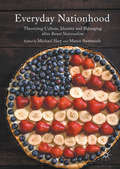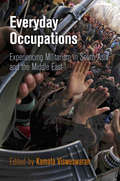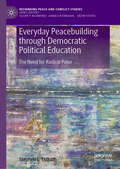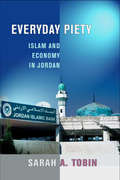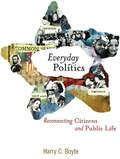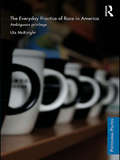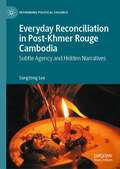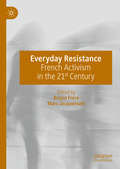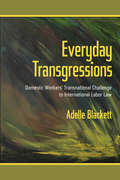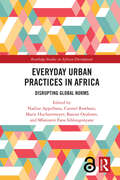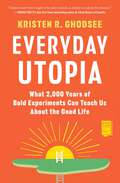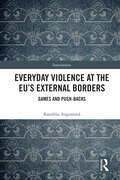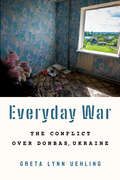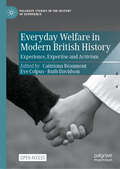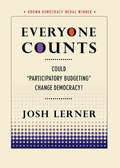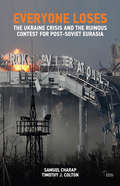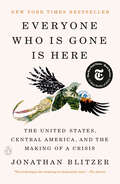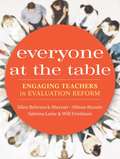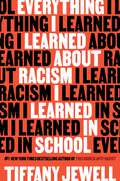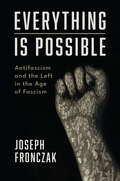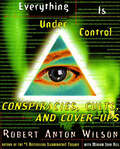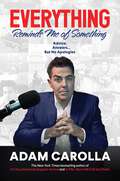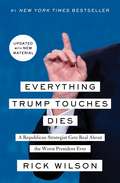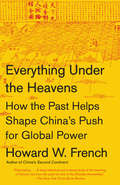- Table View
- List View
Everyday Nationhood
by Michael Skey Marco AntonsichThis edited collection explores the continuing appeal of nationalism around the world. The authors' ground-breaking research demonstrates the ways in which national priorities and sensibilities frame an extraordinary array of activities, from classroom discussions and social media posts to global policy-making, as well as identifying the value that can come from feeling part of a national community, especially during times of economic uncertainty and social change. They also note how attachments to nation can often generate powerful emotions, happiness and pride as well as anger and frustration, which can be used to mobilize substantial numbers of people into action. Featuring contributions from leading social scientists across a range of disciplines, including sociology, geography, political science, social psychology, media and cultural studies, the book presents a number of case studies covering a range of countries including Russia, USA, New Zealand, Serbia, Japan and Greece. Everyday Nationhood will appeal to students and scholars of nationalism, globalization and identity across the social sciences as well as those with an interest in understanding the role of nationalism in shaping some of the most pressing political crises- migration, economic protectionism, populism - of the contemporary era.
Everyday Occupations
by Kamala VisweswaranIn the twenty-first century, political conflict and militarization have come to constitute a global social condition rather than a political exception. Military occupation increasingly informs the politics of both democracies and dictatorships, capitalist and formerly socialist regimes, raising questions about its relationship to sovereignty and the nation-state form. Israel and India are two of the world's most powerful postwar democracies yet have long-standing military occupations. Pakistan, Bangladesh, and Turkey have passed through periods of military dictatorship, but democracy has yielded little for their ethnic minorities who have been incorporated into the electoral process. Sri Lanka and Bangladesh (like India, Pakistan, and Turkey) have felt the imprint of socialism; declarations of peace after long periods of conflict in these countries have not improved the conditions of their minority or indigenous peoples but rather have resulted in "violent peace" and remilitarization. Indeed, the existence of standing troops and ongoing state violence against peoples struggling for self-determination in these regions suggests the expanding and everyday nature of military occupation. Such everydayness raises larger issues about the dominant place of the military in society and the social values surrounding militarism.Everyday Occupations examines militarization from the standpoints of both occupier and occupied. With attention to gender, poetics, satire, and popular culture, contributors who have lived and worked in occupied areas in the Middle East and South Asia explore what kinds of society are foreclosed or made possible by militarism. The outcome is a powerful contribution to the ethnography of political violence.Contributors: Nosheen Ali, Kabita Chakma, Richard Falk, Sandya Hewamanne, Mohamad Junaid, Rhoda Kanaaneh, Hisyar Ozsoy, Cheran Rudhramoorthy, Serap Ruken Sengul, Kamala Visweswaran.
Everyday Peacebuilding through Democratic Political Education: The Need for Radical Poise (Rethinking Peace and Conflict Studies)
by Stephen L. EsquithEveryday peacebuilding through democratic political education is a necessary but not sufficient condition for limiting negative political emotions such as anger, fear, and resentment, and for cultivating the political virtues needed for an alternative, more democratic orientation towards power: one that values and exercises power with other members of emergent political communities, not power over them. These demotic political virtues include self-restraint, resistance, humility, respect for the civic dignity of others, non-violent protest, and the radical poise needed to cultivate and coordinate this constellation of political virtues. For those who have been forcibly displaced or are only dimly aware of their complicity in this type of political violence, to maintain a radically poised stance is a continuing process of democratic political education. This book demonstrates how this notion of Radical Poise in theory and practice can be developed through a hybrid process of political education in one country, Mali, to contest the growth of violence and fear there and elsewhere.
Everyday Piety: Islam and Economy in Jordan
by Sarah A. TobinWorking and living as an authentic Muslim--comporting oneself in an Islamically appropriate way--in the global economy can be very challenging. How do middle-class Muslims living in the Middle East navigate contemporary economic demands in a distinctly Islamic way? What are the impacts of these efforts on their Islamic piety? To what authority does one turn when questions arise? What happens when the answers vary and there is little or no consensus? To answer these questions, Everyday Piety examines the intersection of globalization and Islamic religious life in the city of Amman, Jordan. Drawing on in-depth ethnographic fieldwork in Amman, Sarah A. Tobin demonstrates that Muslims combine their interests in exerting a visible Islam with the opportunities and challenges of advanced capitalism in an urban setting, which ultimately results in the cultivation of a "neoliberal Islamic piety." Neoliberal piety, Tobin contends, is created by both Islamizing economic practices and economizing Islamic piety, and is done in ways that reflect a modern, cosmopolitan style and aesthetic, revealing a keen interest in displays of authenticity on the part of the actors. Tobin highlights sites at which economic life and Islamic virtue intersect: Ramadan, the hijab, Islamic economics, Islamic banking, and consumption. Each case reflects the shift from conditions and contexts of highly regulated and legalized moral behaviors to greater levels of uncertainty and indeterminacy. In its ethnographic richness, this book shows that actors make normative claims of an authentic, real Islam in economic practice and measure them against standards that derive from Islamic law, other sources of knowledge, and the pragmatics of everyday life.
Everyday Politics
by Harry C. BoyteIncreasingly a spectator sport, electoral politics have become bitterly polarized by professional consultants and lobbyists and have been boiled down to the distributive mantra of "who gets what." In Everyday Politics, Harry Boyte transcends partisan politics to offer an alternative. He demonstrates how community-rooted activities reconnect citizens to engaged, responsible public life, and not just on election day but throughout the year. Boyte demonstrates that this type of activism has a rich history and strong philosophical foundation. It rests on the stubborn faith that the talents and insights of ordinary citizens--from nursery school to nursing home--are crucial elements in public life.Drawing on concrete examples of successful public work projects accomplished by diverse groups of people across the nation, Boyte demonstrates how citizens can master essential political skills, such as understanding issues in public terms, mapping complex issues of institutional power to create alliances, raising funds, communicating, and negotiating across lines of difference. He describes how these skills can be used to address the larger challenges of our time, thereby advancing a renewed vision of democratic society and freedom in the twenty-first century.
Everyday Practice of Race in America: Ambiguous Privilege (Postcolonial Politics)
by Utz McKnightAn original contribution to political theory and cultural studies this work argues for a reinterpretation of how race is described in US society. McKnight develops a line of reasoning to explain how we accommodate racial categories in a period when it has become important to adopt anti-racist formal instruments in much of our daily lives. The discussion ranges over a wide theoretical landscape, bringing to bear the insights of Wittgenstein, Stanley Cavell, Michel Foucault, Cornel West and others to the dilemmas represented by the continuing social practice of race. The book lays the theoretical foundation for a politics of critical race practice, it provides insight into why we have sought the legal and formal institutional solutions to racism that have developed since the 1960s, and then describes why these are inadequate to addressing the new practices of racism in society. The work seeks to leave the reader with a sense of possibility, not pessimism; and demonstrates how specific arguments about racial subjection may allow for changing how we live and thereby improve the impact race continues to have in our lives. By developing a new way to critically study how race persists in dominating society, the book provides readers with an understanding of how race is socially constructed today, and will be of great interest to students and scholars of political theory, American politics and race & ethnic politics
Everyday Reconciliation in Post-Khmer Rouge Cambodia: Subtle Agency and Hidden Narratives (Rethinking Political Violence)
by SungYong LeeThis book examines the nature of everyday peace mobilised in post-conflict settings. It specifically aims to examine the reconstruction of relationships between local communities and former Khmer Rouge leaders in Cambodia, using social reconciliation as an indicator of peace. Based on the empirical examination, this study will reveal key features of everyday peace like plurality, connectivity and subtlety, and local communities’ agency for peacebuilding. Research questions that will be examined include what does everyday peace look like? What forms of everyday practice have community members developed and utilised? How is the local process for relationship building related to the wider peacebuilding and governance contexts in the country? And how have community members handled and destabilised the mainstream narratives related to the Khmer Rouge in the process? The volume will present new conceptual and theoretical innovations relevant to the central debates on everyday peace, with an empirical examination of Cambodia.
Everyday Resistance: French Activism in the 21st Century
by Bruno Frère Marc JacquemainThis book studies those who, in various domains of life, are resisting the increasingly harsh day-to-day pressures of “late capitalism,” centering mainly on French examples. Far from the global euphoria of the sixties and seventies, everyday people are trying to loosen the grip of injustice in very concrete ways: people experiencing homelessness try to occupy and live in empty buildings; collectives of small farmers and consumers avoid long (and costly) commercial supply chains to defend their common interests; students and teachers organize to prevent the expulsion of undocumented migrants; and activists in the free software movement fight for the “common ownership” of software and of the Internet. Through civil disobedience in the midst of daily life, people are trying to resist, work against, and change laws that protect the interests of firms and corporations considered socially or ecologically unfair.
Everyday Transgressions: Domestic Workers' Transnational Challenge to International Labor Law
by Adelle BlackettAdelle Blackett tells the story behind the International Labour Organization's (ILO) Decent Work for Domestic Workers Convention No. 189, and its accompanying Recommendation No. 201 which in 2011 created the first comprehensive international standards to extend fundamental protections and rights to the millions of domestic workers laboring in other peoples' homes throughout the world. As the principal legal architect, Blackett is able to take us behind the scenes to show us how Convention No. 189 transgresses the everyday law of the household workplace to embrace domestic workers' human rights claim to be both workers like any other, and workers like no other. In doing so, she discusses the importance of understanding historical forms of invisibility, recognizes the influence of the domestic workers themselves, and weaves in poignant experiences, infusing the discussion of laws and standards with intimate examples and sophisticated analyses. Looking to the future, she ponders how international institutions such as the ILO will address labor market informality alongside national and regional law reform. Regardless of what comes next, Everyday Transgressions establishes that domestic workers' victory is a victory for the ILO and for all those who struggle for an inclusive, transnational vision of labor law, rooted in social justice.
Everyday Urban Practices in Africa: Disrupting Global Norms (Routledge Studies in African Development)
by Nadine Appelhans Basirat Oyalowo Carmel Rawhani Marie Huchzermeyer Mfaniseni Fana SihlongonyaneThis book disrupts the dominant underlying international norms informing urban development strategies across African cities. International policy frameworks have created a new universal agenda for developing cities. However, these frameworks have also imposed global paradigms and discourses that are often in conflict with local urbanisms. As we approach the deadline for achieving the Sustainable Development Goals, there is need for reflection and deliberation on a post-2030 agenda.The authors identify powerful assumptions, norms, and positionalities that obfuscate the efforts to achieve sustainable development in African cities, as well as along the North–South divide. They argue that a disruptive critique of these normative concepts, grounded in the lived African urban everyday, opens up opportunities to dismantle their assumed neutrality. Through disruption, the authors critically re-interpret the meanings of policy and the praxis of local urbanism, ultimately challenging the logic of universalising concepts underpinning implementation in the current international policy system, and asserting the need for contextualised urban policies.The book will be of interest to scholars and students of urban studies, development planning, urban governance, human settlements, development studies, urban geography, and African studies. It will also be useful for practitioners including town and regional/urban planners, urban policy consultants, and international development cooperation agencies.The Open Access version of this book, available at http://www.taylorfrancis.com, has been made available under a Creative Commons Attribution-Non Commercial-No Derivatives (CC-BY-NC-ND) 4.0 license.
Everyday Utopia: What 2,000 Years of Wild Experiments Can Teach Us About the Good Life
by Kristen R. GhodseeA &“fascinating&” (The Wall Street Journal), &“spirited and inspiring&” (Jacobin) tour through the ages in search of the thinkers and communities that have dared to reimagine how we might better live our daily lives.In the 6th century BCE, the Greek philosopher Pythagoras—a man remembered today more for his theorem about right-angled triangles than for his progressive politics—founded a commune in a seaside village in what&’s now southern Italy. The men and women there shared their property, lived as equals, and dedicated themselves to the study of mathematics and the mysteries of the universe. Ever since, humans have been dreaming up better ways to organize how we live together, pool our resources, raise our children, and determine who&’s part of our families. Some of these experiments burned brightly for only a brief while, but others carry on today: from the Danish cohousing communities that share chores and deepen neighborly bonds, to matriarchal Colombian ecovillages where residents grow their own food; and from Connecticut, where new laws make it easier for extra &“alloparents&” to help raise children not their own, to China where planned microdistricts ensure everything a busy household might need is nearby. One of those startlingly rare books that upends what you think is possible, Everyday Utopia provides a &“powerful reminder that dreaming of better worlds is not just some fantastical project, but also a political one&” (Rebecca Traister, New York Times bestselling author of Good and Mad). This &“must-read&” (Thomas Piketty, New York Times bestselling author of A Brief History of Equality) offers a radically hopeful vision for how to build more contented and connected societies, alongside a practical guide to what we all can do in the meantime to live the good life each and every day.
Everyday Violence at the EU’s External Borders: Games and Push-backs (Interventions)
by Karolina AugustovaCombining conflict studies and feminist perspectives on everyday violence, this book analyses games and push-back which are vectors to migrants' border-crossing attempts and violence that aims to deter their journeys at the Bosnian-Croatian border. It questions how these diverse forms of violence are experienced, not treating violence as singular episodes but rather paying attention to how migrants make meaning of it across months and years. The author examines direct violence and its symbiosis with structural harms and questions how these turn into everyday, concrete, and intimate processes at the border. She also questions who this violence targets and where it takes place and asks whether and how the dominant assumptions about race and gender impact men's migration journeys. The book will appeal to scholars and postgraduate students interested in issues of migration, violence, masculinities, racialization, the European Union’s border governance, and scholar activism.
Everyday War: The Conflict over Donbas, Ukraine
by Greta Lynn UehlingEveryday War provides an accessible lens through which to understand what noncombatant civilians go through in a country at war. What goes through the mind of a mother who must send her child to school across a minefield or the men who belong to groups of volunteer body collectors? In Ukraine, such questions have been part of the daily calculus of life. Greta Uehling engages with the lives of ordinary people living in and around the armed conflict over Donbas that began in 2014 and shows how conventional understandings of war are incomplete.In Ukraine, landscapes filled with death and destruction prompted attentiveness to human vulnerabilities and the cultivation of everyday, interpersonal peace. Uehling explores a constellation of social practices where ethics of care were in operation. People were also drawn into the conflict in an everyday form of war that included provisioning fighters with military equipment they purchased themselves, smuggling insulin, and cutting ties to former friends. Each chapter considers a different site where care can produce interpersonal peace or its antipode, everyday war. Bridging the fields of political geography, international relations, peace and conflict studies, and anthropology, Everyday War considers where peace can be cultivated at an everyday level.
Everyday Welfare in Modern British History: Experience, Expertise and Activism (Palgrave Studies in the History of Experience)
by Eve Colpus Ruth Davidson Caitríona BeaumontThis open access book offers a new approach to understandings of welfare in modern Britain. Foregrounding the agency individuals and groups claimed through experiential expertise, it traces deep connections between personal experience, welfare, and activism across diverse settings in modern Britain. The experiential experts studied in this collection include women, students, children, women who have sex with women, bereaved families, community groups, individuals living in poverty, adults whose status sits outside professional categories, health service users, and people of faith. Chapters trace how these groups have used their experiences to assert an expert witness status and have sought out new spaces to expand the scope, inclusivity, and applicability of welfare services.
Everyone Counts: Could "Participatory Budgeting" Change Democracy?
by Josh LernerThe Laurence and Lynne Brown Democracy Medal recognizes outstanding individuals, groups, and organizations that produce exceptional innovations to further democracy in the United States or around the world. The inaugural medal winner, the Participatory Budgeting Project (PBP), is an innovative not-for-profit organization that promotes "participatory budgeting," an inclusive process that empowers community members to make informed decisions about public spending. More than 46,000 people in communities across the United States have decided how to spend $45 million through programs that PBP helped spark over the last five years. In Everyone Counts, PBP co-founder and executive director Josh Lerner provides a concise history of the organization's origins and its vision, highlighting its real-world successes in fostering grassroots budgeting campaigns in such cities as New York, Boston, and Chicago. As more and more communities turn to participatory budgeting as a means of engaging citizens, prioritizing civic projects, and allocating local, state, and federal funding, this cogent volume will offer guidance and inspiration to others who want to transform democracy in the United States and elsewhere. “The Participatory Budgeting Project exemplifies the essential features the award committee was looking for in its inaugural recipient. Political and economic inequality is part of the American national discussion, and participatory budgeting helps empower marginalized groups that do not normally take part in a process that is so critical for democratic life.”— John Gastil, Director of the McCourtney Institute for Democracy
Everyone Loses: The Ukraine Crisis and the Ruinous Contest for Post-Soviet Eurasia (Adelphi series)
by Timothy J. Colton Samuel CharapDisorder erupted in Ukraine in 2014, involving the overthrow of a sitting government, the Russian annexation of the Crimean peninsula, and a violent insurrection, supported by Moscow, in the east of the country. <P><P> This Adelphi book argues that the crisis has yielded a ruinous outcome, in which all the parties are worse off and international security has deteriorated. This negative-sum scenario resulted from years of zero-sum behaviour on the part of Russia and the West in post-Soviet Eurasia, which the authors rigorously analyse. The rivalry was manageable in the early period after the Cold War, only to become entrenched and bitter a decade later. The upshot has been systematic losses for Russia, the West and the countries caught in between. <P><P> All the governments involved must recognise that long-standing policies aimed at achieving one-sided advantage have reached a dead end, Charap and Colton argue, and commit to finding mutually acceptable alternatives through patient negotiation.
Everyone Who Is Gone Is Here: The United States, Central America, and the Making of a Crisis
by Jonathan BlitzerA National Bestseller • A New York Times Top 10 Book of 2024 • Named a Best Book of the Year by The New Yorker, Chicago Tribune, Newsweek, PBS NewsHour, LitHub, Kirkus Reviews, Publishers Lunch, Christian Science Monitor, and Counterpunch • One of Barack Obama's Summer Reading List Picks • Named a Notable Book by New York Times and Washington Post • Nominated for the Carnegie Medal for Excellence and the Baillie Gifford Prize for Non-Fiction&“What an incredibly thorough documentation of the causes of the immigration crisis, the discussions that have been going on through multiple administrations.&” —Jon Stewart, The Daily Show&“Everyone Who Is Gone Is Here is sure to take its place as one of the definitive accounts of the U.S. and Central American immigration puzzle. . . . Hopefully, those with the power to change things will listen.&” —Manuel Roig-Franzia, Washington PostAn epic, heartbreaking, and deeply reported history of the disastrous humanitarian crisis at the southern border told through the lives of the migrants forced to risk everything and the policymakers who determine their fate, by New Yorker staff writer Jonathan BlitzerEveryone who makes the journey faces an impossible choice. Hundreds of thousands of people who arrive every year at the US-Mexico border travel far from their homes. For years, the majority came from El Salvador, Guatemala, and Honduras, but many more have begun their journey much farther away. Some flee persecution, others crime or hunger. They may have already been deported, but the United States remains their only hope for safety and prosperity. They will take their chances.As Jonathan Blitzer dramatizes with forensic, unprecedented reporting, this crisis is the result of decades of misguided policy and sweeping corruption. Brilliantly weaving the stories of Central Americans whose lives have been devastated by chronic political conflict and violence with those of American activists, government officials, and the politicians responsible for the country&’s tragically tangled immigration policy, Blitzer reveals the full, layered picture of this vast and unremitting conflict.Everyone Who Is Gone Is Here tells the epic story of the people whose lives ebb and flow across the border, delving into the heart of American life itself. This vital and remarkable story has shaped the nation&’s turbulent politics and culture in countless ways—and will almost certainly determine its future.
Everyone at the Table
by Ellen Behrstock-Sherratt Sabrina W. Laine Will Friedman Allison RizzoloA proven method for working with teachers to design better evaluationsThere is no magic formula for successfully designing a teacher evaluation system. However there is abundant evidence that suggests involving teachers in the process will reduce the likelihood of opposition, gridlock, and reform failure. Everyone at the Table provides materials to genuinely engage teachers in the evaluation process. The book is a research-based and field-tested practical guide for school leaders. With this resource, educators will have the tools they need to develop meaningful teacher evaluations.Offers a collaborative approach to designing teacher evaluationsIncludes a companion web-based resource, with video This research-based program outlines a solid plan for improving teacher effectiveness through evaluation reform.
Everything I Learned About Racism I Learned in School
by Tiffany JewellFrom the #1 New York Times bestselling author of This Book Is Anti-Racist and The Antiracist Kid, Tiffany Jewell, this YA nonfiction book, highlighting inequities Black and Brown students face from preschool through college, is the most important, empowering read this year.From preschool to higher education and everything in between, Everything I Learned About Racism I Learned in School focuses on the experiences Black and Brown students face as a direct result of the racism built into schools across the United States.The overarching nonfiction narrative follows author Tiffany Jewell from early elementary school through her time at college, unpacking the history of systemic racism in the American educational system along the way. Throughout the book, other writers of the global majority share a wide variety of personal narratives and stories based on their own school experiences.Contributors include New York Times bestseller Joanna Ho; award winners Minh Lê, Randy Ribay, and Torrey Maldonado; authors James Bird and Rebekah Borucki; author-educators Amelia A. Sherwood, Roberto Germán, Liz Kleinrock, Gary R. Gray Jr., Lorena Germán, Patrick Harris II, shea wesley martin, David Ryan Barcega Castro-Harris, Ozy Aloziem, Gayatri Sethi, and Dulce-Marie Flecha; and even a couple of teen writers!Everything I Learned About Racism I Learned in School provides young folks with the context to think critically about and chart their own course through their current schooling—and any future schooling they may pursue.
Everything Is Possible: Antifascism and the Left in the Age of Fascism
by Joseph FronczakThe fascinating history of how the antifascist movement of the 1930s created “the left” as we know it today In the middle years of the Great Depression, the antifascist movement became a global political force, powerfully uniting people from across divisions of ideology, geography, race, language, and nationality. Joseph Fronczak shows how socialists, liberals, communists, anarchists, and others achieved a semblance of unity in the fight against fascism. Depression-era antifascists were populist, militant, and internationalist. They understood fascism in global terms, and they were determined to fight it on local terms. In the United States, antifascists fought against fascism on the streets of cities such as Chicago and New York, and they connected their own fights to the ones raging in Germany, Italy, and Spain. As he traces the global trajectory of the antifascist movement, Fronczak argues that its most significant legacy is its creation of “the left” as we know it today: an international conglomeration of people committed to a shared politics of solidarity.
Everything Is Under Control: Conspiracies, Cults, and Cover-ups
by Robert Anton Wilson Miriam Joan HillEverything Is under Control is Wilson's -to-Z of conspiracy theories-real, half-real and completely imaginary. Highly cross-referenced and written in a journalistic tone, it ioncludes fascinating information on Area 51, the Bermuda Triangle, Naom Chomsky, Crying of Lot 49, "Bob" Dobbs, Elders of Zion, the federal reserve, Holocaust deniers, Iran-Contra, JFK, Knights Templar, McCarthy, Norplant, Operation Mind Control, Pearl Harbor, UFO Abductiion, Wicca, and more.
Everything Reminds Me of Something: Advice, Answers...but No Apologies
by Adam CarollaAs seen on Hannity! The bestselling comedian returns to respond and rant on real questions about life and love, careers and cars, and everything else from fans and famous friends.Ever wonder what you would say or do if you didn&’t give a f**k? Adam Carolla can tell you. In his sixth book, the comedian, podcaster, and provocateur does what he does best—doles out advice and opinions with utter disregard for our politically correct, self-righteous, virtue signaling, woke times. Thanks to decades of hosting MTV and radio&’s Loveline, his Guinness World Record–breaking podcast and touring the stand-up circuit, no one in comedy is as gifted at thinking on their feet. Taking actual questions from his fans—and even some celebrity friends, including Ray Romano, Maria Menounos, and Judd Apatow—Adam dishes out hilarious rants, unpredictable tangents, brilliant inventions, sage advice, and controversial opinions in a way only a self-proclaimed asshole can.
Everything There Is
by M.G. VassanjiFrom two-time Giller Prize winner M.G. Vassanji, one of Canada&’s finest and most celebrated writers, comes a brilliant new novel that vividly examines the seemingly incongruous worlds of science, religion and desire.Nurul Islam is a world-renowned physicist, professor at Imperial College, London, and one half of the Islam-Rosenfeld theory, the first step in a grand unification of forces and a Theory of Everything. A family man profoundly influenced by his pious father, Nurul is happily married to Sakina Begum by an arranged marriage. They have three children. But when Nurul travels to Cambridge, Massachusetts, to give a public lecture at Harvard, he falls in love with a graduate student, Hilary Chase.At the same time, Nurul Islam's outspoken, philosophical views about the nature of physics and God have earned him the ire of fundamentalist preachers in Pakistan. He makes enemies of the political and military establishments when he refuses to contribute to Pakistan's nuclear weapons project. Meanwhile, a contingent of physicists begins a smear campaign, claiming that Nurul Islams's contribution to the unification theory was plagiarized. All these events converge upon Sakina Begum who, smarting from her husband's betrayal, unwittingly commits a betrayal of her own. Everything that has worked together as though preordained since his childhood to take him to the pinnacle of scientific achievement suddenly falls apart.An exceptionally wise and intimate account of love, honour, guilt and genius, Everything There Is gives us an engaging portrait of a traditional, spiritual man facing the onslaught of inescapable forces.
Everything Trump Touches Dies: A Republican Strategist Gets Real About the Worst President Ever
by Rick WilsonFrom Rick Wilson—longtime Republican strategist, political commentator, Daily Beast contributor—the #1 New York Times bestseller about the disease that is destroying the conservative movement and burning down the GOP: Trumpism. Includes an all-new chapter analyzing Trump&’s impact on the 2018 elections.In the #1 New York Times bestselling Everything Trump Touches Dies, political campaign strategist and commentator Rick Wilson delivers &“a searingly honest, bitingly funny, comprehensive answer to the question we find ourselves asking most mornings: &‘What the hell is going on?&’ (Chicago Tribune). The Guardian hails Everything Trump Touches Dies, saying it gives, &“more unvarnished truths about Donald Trump than anyone else in the American political establishment has offered. Wilson never holds back.&” Rick mercilessly exposes the damage Trump has done to the country, to the Republican Party, and to the conservative movement that has abandoned its principles for the worst President in American history. Wilson unblinkingly dismantles Trump&’s deceptions and the illusions to which his supporters cling, shedding light on the guilty parties who empower and enable Trump in Washington and in the media. He calls out the race-war dead-enders who hitched a ride with Trump, the alt-right basement dwellers who worship him, and the social conservatives who looked the other way. Publishers Weekly calls it, &“a scathing, profane, unflinching, and laugh-out-loud funny rebuke of Donald Trump and his presidency.&” No left-winger, Wilson is a lifelong conservative who delivers his withering critique of Trump from the right. A leader of the Never Trump movement, he warned from the start that Trump would destroy the lives and reputations of everyone in his orbit, and Everything Trump Touches Dies is a deft chronicle the tragicomic political story of our time. From the early campaign days through the shock of election night, to the inconceivable train-wreck of Trump&’s first year. Rick Wilson provides not only an insightful analysis of the Trump administration, but also an optimistic path forward for the GOP, the conservative movement, and the country. &“Hilarious, smartly written, and usually spot-on&” (Kirkus Reviews), Everything Trump Touches Dies is perfect for those on either side of the aisle who need a dose of unvarnished reality, a good laugh, a strong cocktail, and a return to sanity in American politics.
Everything Under the Heavens: How the Past Helps Shape China's Push for Global Power
by Howard W. FrenchFrom the former New York Times Asia correspondent and author of China's Second Continent, an incisive investigation of China's ideological development as it becomes an ever more aggressive player in regional and global diplomacy. For many years after its reform and opening in 1978, China maintained an attitude of false modesty about its ambitions. That role, reports Howard French, has been set aside. China has asserted its place among the global heavyweights, revealing its plans for pan-Asian dominance by building its navy, increasing territorial claims to areas like the South China Sea, and diplomatically bullying smaller players. Underlying this attitude is a strain of thinking that casts China's present-day actions in decidedly historical terms, as the path to restoring the dynastic glory of the past. If we understand how that historical identity relates to current actions, in ways ideological, philosophical, and even legal, we can learn to forecast just what kind of global power China stands to become--and to interact wisely with a future peer. Steeped in deeply researched history as well as on-the-ground reporting, this is French at his revelatory best.From the Hardcover edition.
